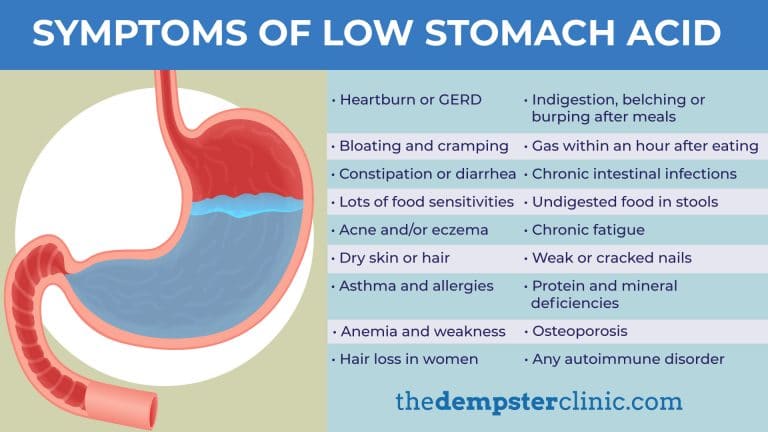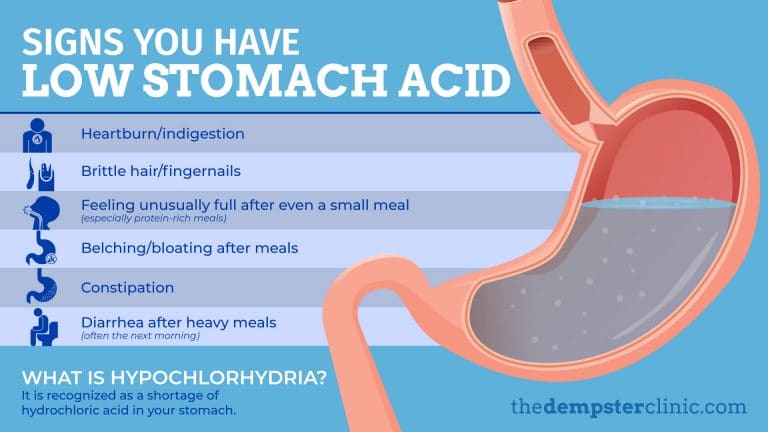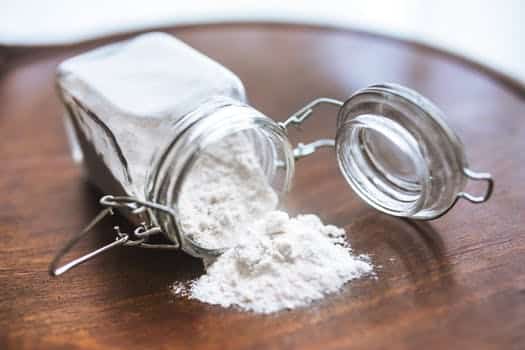Are you dealing with health problems that disrupt your digestion? The problem might be called hypochlorhydria – or low stomach acid. While your stomach is an organ that can withstand harsh treatment, you’re sure to notice as soon as it stops working. This article will go through the details of how to discover whether you have adequate stomach acid levels, and what you need to do to restore them if you don’t.
What Does Low Stomach Acid Mean?
Stomach acid is officially known as hydrochloric acid (HCL) because its chemical composition is one part hydrogen to one part chloride. This compound is critical for the digestive process. When your stomach acid levels aren’t where they should be, your system will struggle to absorb essential minerals and proteins, which can lead to deficiencies. Likewise, stomach acid is responsible for killing harmful bacteria enzymes that enter your system.
Low stomach acid, also known as hypochlorhydria, is a condition that can lead to numerous health problems. Without adequate acid levels, you will leave your stomach vulnerable to disease and painful side effects, including the following:
- inflammation
- stomach pain
- nausea
- rheumatoid arthritis
- cancer
- small intestinal bacterial growth (SIBO)
- acid reflux
- heartburn
- malnutrition
- leaky gut syndrome
- general skin problems

Unfortunately, few people with low stomach acid are correctly diagnosed because the symptoms are so similar to many other health conditions. Functional medicine doctors are an exception, as we strive to look at the big picture of your symptoms to determine what their root cause is.
What are the Causes of Low Stomach Acid?
Low stomach acid has numerous contributing factors, so it’s difficult to determine the exact cause of your symptoms. Two common triggers for the condition are high stress levels and eating an unhealthy diet. Other factors include eating your meals too quickly, ingesting too much sugar, undiagnosed food sensitivities or allergies, chronic illness, interactions from prescription drugs, and old age.

By addressing these issues, you can normalize your stomach acid levels and consequently improve your overall digestive health. But first, you will need to determine whether your stomach acid levels are low in the first place.
Five Tests to Determine Whether You Have Low Stomach Acid
Because of the overlap with symptoms of low stomach acid and other health problems, the best way to determine whether you have the condition is through specialized testing, either in a lab or at home. Below are five tests that I recommend for gaining insight into your stomach acid levels.
1. CBC and CMP:
If you’re working with a skilled functional medicine doctor, you can get a sense of your stomach acid levels from a complete blood count (CBC) and comprehensive metabolic panels (CMP) test. These routine tests provide insight into your base levels of stomach acid, especially if you receive them regularly
Generally, the indicators that your doctor will look for include the following:
- Low Iron levels: Having low iron is a common sign of hypochlorhydria, as iron requires stomach acid to be properly absorbed.
- Low Phosphorous Levels: low phosphorous levels, especially when paired with a vitamin D deficiency, is a sign of low HCL levels.
- Abnormal Serum Protein and Globulin Levels: If your serum and globulin levels are above or below where they should be.
- Low Chloride Levels: Hydrochloric acid contains plenty of chloride, so low chloride levels (anything under 100) are a sign your stomach acid levels are below standard levels.
- High BUN Levels: a BUN level (blood urea nitrogen) above 20 can be a sign that your system doesn’t have enough stomach acid to deal with nitrogen waste in the bloodstream.
2. The Gastric Acid Secretion Test
If your stomach acid problems seem severe, your doctor might recommend a gastric acid secretion test. As the test is both invasive and expensive, it’s usually saved for extreme cases. The test requires you to receive a hormone injection that stimulates your stomach cells to release acid, and then tubes are inserted into your stomach via the esophagus to suck out existing stomach acid. The acid that is collected is then measured and tested for its pH level. A small amount with a high pH level is a sign something is wrong.
3. The Heidelberg Stomach Acid Test
Considered to be the gold standard for stomach acid testing, the Heidelberg stomach acid test provides precise results about the status of your stomach acid. You will need to fast for twelve hours before the test and then swallow a small electronic capsule. Immediately after, you will drink a baking soda solution to neutralize any HCL in your stomach naturally. The tablet will record the time it takes your stomach to restore its acidity levels, which will determine whether your stomach acid levels are low.
4. Betaine HCL Challenge Test
If you want to get a rough estimate of your stomach acid levels at home, this simple test provides reasonably reliable results. The test is best for anyone suffering from mild cases of the previously mentioned symptoms. If your side effects are more severe, skip this test and go straight to the doctor instead.
To perform the test, you’ll need to have Betaine HCL with pepsin on hand. Eat a meal with plenty of protein (at least six ounces of meat) before the test, and take one tablet while in the middle of the meal. Continue eating, and monitor your symptoms afterward. If you have indigestion like a burning hotness on your chest, your stomach acid levels are likely where they should be. In contrast, if you feel fine, your acid levels are likely low.
Repeat this test at least three times, and if you get the same results, you can be reasonably sure about the status of your stomach acid.
5. Baking Soda Acid Test
For another home-based test that delivers reasonably accurate results, all you need is baking soda. As this test is cheap and safe, it’s a smart option for regularly checking on your stomach acid levels. However, it has a lot of variables that can trigger false positives or negatives, so you should perform it repeatedly for the most accurate results.
To try it out, mix ¼ tsp of baking soda in four ounces of cold water, and drink the blend first thing in the morning before you eat or drink anything else. Time how long it takes for you to burp. It’s a sign of low stomach acid if it takes more than five minutes or you don’t burp at all.

The test works by triggering a chemical reaction in your stomach from mixing the base baking soda with stomach acid. The natural response if you have enough stomach acid is carbon dioxide gas, which triggers burping.
How to Improve Low Stomach Acid Naturally
What’s the next step if you take a test and find that your stomach acid levels are lacking? There are several solutions for improving your stomach acid levels naturally, and they tend to work quickly. Try them for yourself, and you might be impressed with the results.
Add HCL with Pepsin to Your Diet: Many people with low stomach acid have found that taking hydrochloric acid with pepsin produces positive results. This supplements what your system naturally produces to improve digestion and absorb nutrients. Just make sure you take it with protein to ensure you get good results.
Take a Shot of Apple Cider Vinegar: An easy way to improve your stomach’s pH levels is to take a tablespoon of apple cider vinegar before meals. Blend it in a few ounces of water to dilute the taste, and you’ll have a natural remedy without adverse side effects.
- Eat Manuka Honey: This special New Zealand honey contains extraordinary antimicrobial properties, which makes it practical for treating bacterial growths that can lead to SIBO. A teaspoon a day can combat low stomach acid conditions and help heal stomach ulcers as well.
- Take Digestive Enzymes: Digestive enzymes are designed to improve your digestion by breaking down the nutrients you ingest. You can take a cap or two before meals for optimal results until your stomach acid levels rebalance.

- Chew Thoroughly and Eat Smaller Meals: The quality of your diet makes a difference for stomach acid production, and so does how you eat it. Taking the time to chew properly puts less responsibility on your digestive system, which minimizes the side effects of low stomach acid. You can keep things functioning as they should by chewing each bite over a dozen times and eating smaller meals throughout the day so that your stomach doesn’t get overwhelmed.
Address Low Stomach Acid at The Dempster Clinic- Center for Functional Medicine
Dealing with digestive problems shouldn’t become the norm for your body, which is why I recommend seeking expert treatment if you suspect you have issues with low stomach acid. At The Dempster Clinic- Center for Functional Medicine, I can work with you to determine what’s causing your symptoms and help you get back on track to better health.
I am pleased to offer a Complimentary 15-minute Discovery Session for all potential patients. This session can take place over the phone or at the clinic in person. It provides an opportunity for you to learn more about the services I offer and how they can be of benefit to you.
Please schedule an appointment today! Your best health awaits.
Dr. John Dempster BSc., ND, FAAFM
The Dempster Clinic- Center for Functional Medicine


